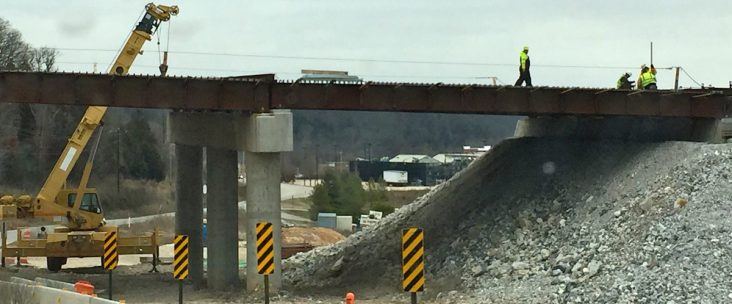5.9% of Arkansas bridges structurally deficient, down from 6.3% in 2016
by June 27, 2018 12:37 pm 652 views

In Arkansas, 5.9% of the state’s 12,864 bridges (765) are structurally deficient, according to a 2018 report by American Road & Transportation Builders Association (ARTBA).
The ARTBA released the report based on 2017 bridge data from the Federal Highway Administration, and structurally deficient means one of the key elements of the bridge is in poor or worse condition.
The 1st Congressional District, which includes eastern Arkansas, has 6.3%, or 293, deficient bridges. The top three most traveled deficient bridges include one in Crittenden County and two in Lonoke County. The previous, with 40,000 daily crossings, is the Mississippi River Bridge on Interstate 40, and the latter two, each with 12,500 daily crossings, include the southbound and northbound segments of the Cypress Creek Bridge on U.S. Highway 67.
The 2nd Congressional District, which includes central Arkansas, has 3.6%, or 65, of the structural deficient bridges in the state. The top three most heavily traveled deficient bridges are in Pulaski County, including the Union Pacific Railroad overpass on Interstate 30, with 123,000 daily crossings; the Union Pacific Railroad overpass at Locust Street and South Fort Road, with 123,000 daily crossings; and the Arkansas River Bridge on I-30, with 114,000 daily crossings.
The 3rd Congressional District of Arkansas, which includes Northwest Arkansas and the Fort Smith metro, has 16.2%, or 124, of the deficient bridges, the report shows. Benton County has the three most heavily traveled bridges that are deficient in Northwest Arkansas, including the Little Sugar Creek Bridge on Arkansas Highway 340, the Spring Branch Bridge on Arkansas Highway 59 and the Wildcat Creek Bridge on Old Highway 68. Daily crossings were 12,000, 9,000 and 6,250, respectively, the report shows.
A $1.26 million project to replace the Wildcat Creek Bridge will be completed soon, and a ribbon cutting has been set for June 28, said Benton County Judge Barry Moehring, adding the county was responsible for only 2% of the cost as it was a state-aid project. Phillips Hardy Inc. of Booneville, Mo. was the contractor.
Projects to replace the Little Sugar Creek and Spring Branch bridges are set to start in May 2019 and July 2019, respectively, said Danny Straessle, public information officer for Arkansas Department of Transportation.
The 4th Congressional District, which includes southern and up to north central Arkansas, has 6.5%, or 362, deficient bridges. The top three most traveled deficient bridges are in Crawford and Sebastian counties, and each have 21,000 daily crossings: Town Branch Bridge on U.S. Highway 64, the westbound lanes of the Fort Smith Railroad overpass on Interstate 540 and the southbound segment of I-540 over state highway 255.
Nationwide, 8.9%, or 54,259, of the 612,677 bridges in the United States are structurally deficient, and motorists cross these bridges nearly 175 million times daily. In Arkansas, motorists cross its deficient bridges 2.07 million times daily.
ARTBA ranked Arkansas 34th nationwide, based on the percentage of deficient bridges in 2017. The state also was ranked 34th in 2016, when 6.3%, or 811, of the 12,871 bridges in the state were deficient. Rhode Island has the highest percentage of deficient bridges at 23.3%, or 181 bridges, and Texas has the lowest percentage at 1.6%, or 847 bridges. Iowa has the highest number of deficient bridges at 5,067.
Arkansas has identified needed repairs on 2,471 bridges, and the work is expected to cost $2.6 billion.
Following are other key points in the report about Arkansas bridges.
• Of the 765 structurally deficient bridges in Arkansas, 24 are on the Interstate Highway System.
• 1,391 bridges are posted for load, which may restrict the size and weight of vehicles crossing the structure.
• Over the last five years, bridge investment has accounted for 26.2% of highway and bridge contract awards in the state, compared to an average of 28.9% nationwide.
• Over the last 10 years, 1,182 new bridges have been constructed in the state, and 86 have undergone major reconstruction.
